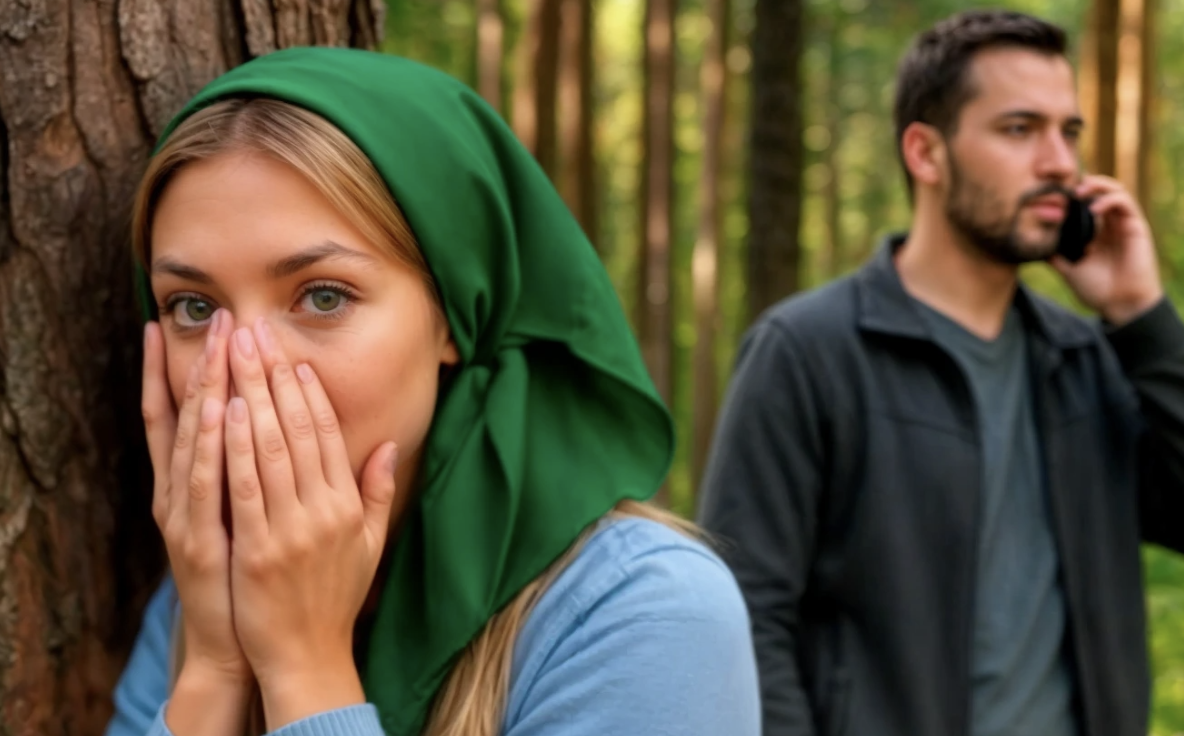The air in the pine forest was thick and saturated, like liquid honey, filled with the tart scent of needles, damp earth, and fallen leaves just touched by decay. The rays of the warm, no longer scorching but gentle September sun filtered through the dense canopy of fir and pine boughs, scattering fanciful patterns of light and shadow across the ground. Those golden patches quivered on a carpet of brown moss and shed needles, creating a feeling of unreal, fairytale coziness. It seemed that time in this place had slowed its pace, yielding to the forest’s majestic, unhurried rhythm.
Margarita walked slowly along a barely visible path, peering at the curious stumps and roots, listening to the forest’s many-voiced symphony: somewhere up high a woodpecker was busily tapping, unseen birds were calling to each other, and beneath her feet the soles of her boots softly rustled over the springy moss. She bent down, pushed aside a tuft of withered grass—and couldn’t believe her eyes. Right at the base of a sprawling, mighty pine, as if arranged by an invisible hand, stood a whole cheerful family of porcini. Their caps were firm, velvety, the color of ripe cinnamon—sturdy and clean, without a single worm.
Her heart gave a joyful jolt. She slipped the woven basket from her shoulder—the one she had braided herself last spring from pliant willow rods on long evenings while the rain drummed outside. She took out her trusty knife with its wooden handle polished by time—the very one her father had given her many years ago, saying a good tool should serve faithfully and well. Carefully, so as not to damage the delicate mycelium, she cut each stout porcini and laid it in the basket. A subtle, incomparable fragrance rose from them—the scent of freshness, forest, autumn. She already pictured how she would be cleaning them that evening in the kitchen, how their small apartment would fill with the soul-warming aroma of fried potatoes with mushrooms, how their daughter Liza would beg for seconds, and how Anton would unfailingly deliver his signature line that no one in the world made that simple dish better than his wife.
“Ritochka!” her husband’s voice came from the thicket, muffled by distance and the dense woods. “Ritochka, where are you?”
Margarita chuckled softly, with girlish mischief, and nimbly slipped behind the thick trunk of an old pine, so wide two people would need to encircle it. Its rough bark felt pleasantly cool even through her jacket. Anton loved these playful ambushes—sneaking up on her at home and gently laying a hand on her shoulder when she was absorbed in something: when she stood at the stove stirring a pot, or clipped laundry on the balcony, or washed dishes, gazing into a window fogged with steam. She always started, sometimes even cried out, dropping a ladle or a clothespin. Now it was her moment in the spotlight—to give him a little scare, just a little, and then laugh together about it.
She pressed her back to the tree, trying to breathe as quietly as possible, and listened. Her husband’s steps were drawing nearer, but unhurriedly, with long pauses. He, too, must have been scanning the grass and deadfall for mushroom caps. The familiar crunch and swish beneath his boots were easy to recognize. And suddenly she could make out that he was speaking. Talking to someone. At first she thought they had run into other mushroom hunters—on weekends that was common; half of Tver headed to the woods. But no other voices were audible, only his, muted yet distinct. So, a call. She was just about to step out from her hiding place, gather the mushrooms she had scattered for effect, and rush toward him when she caught individual words—and the basket slipped from her numb fingers. The firm white caps, her treasured find, spilled onto the mossy ground like pearls from a snapped string.
“Katyush, of course I miss you terribly and can’t wait to see you!” Anton’s voice sounded so tender, so heartfelt—the way he had always spoken only to her. “Yes, my darling, kisses, I love you madly and I’m holding you tight!”
Margarita pressed herself to the pine again, but now not in play—seeking support. Breathing grew difficult; a dull, heavy ache bloomed in her chest. Ten years. For ten years they had been together, hand in hand; they had been through so much, they were raising Liza, building their household, their life—a life she had thought happy and solid. And all of it in an instant became a fragile house of cards collapsing at the faintest breath. From a few tender words spoken in the forest hush—to someone else.
Her husband kept talking for several more minutes, but she no longer heard, no longer listened. The words merged into a single oppressive hum. When he finally ended the call, his footsteps—he was whistling some carefree tune—moved deeper into the forest. He walked away, suspecting nothing, while she remained by the pine, alone, with a shattered heart and mushrooms scattered on the ground.
Slowly, as if all her bones had suddenly turned old and heavy, she sank onto the soft, cool moss at the foot of her shelter and tilted her head back. Through the dense interlace of branches and needles she could see patches of pure, impossibly distant blue sky. Just as pure and distant as it had been fifteen years ago, on the day her father died. She had always sought answers and comfort in that bottomless blue, peering into it as she had once peered into his wise, kind eyes. Back then, at fifteen, it had also seemed to her that life was over, that happiness would never return. But she found the strength. She studied, worked, met Anton, had a daughter, built a family, a home, a world of her own. And now it was autumn again. The leaves were yellowing outside the window of her soul again. And again everything was falling apart.
“Why, Papa?” she whispered, gazing at the sky. “Why is this happening to me?”
As always, there was no answer. Only the wind whispering faintly with the pine tops, and somewhere in the distance a cuckoo kept up its unhurried song.
Margarita sat like that for maybe fifteen minutes, maybe half an hour. Then she drew a deep breath, wiped her face with her sleeve, and stood up. Tears and despair had never helped anyone. Only a clear head and a cold, ruthless calculation did. She gathered the mushrooms, placed them carefully back into the basket, brushed the clinging needles from her clothes, and slowly walked toward the sound of her husband’s steps.
He noticed her approaching, and his face lit with a wide, so familiar and beloved smile. He looked at her with tenderness and a touch of indulgence, the way one looks at the dearest and slightly helpless person.
“Good grief, what happened to you!” He strode up to her, took her by the chin, and examined her face closely. “My little mess! You’ve smudged yourself all over in the woods!”
As he often did, he moistened a finger with his tongue and, with a look of solicitous care, began to rub at an imaginary speck on her cheek. She looked at him and felt everything inside her tighten into a hard, cold knot. But she let him finish the ritual.
“There, that’s much better,” Anton declared with satisfaction. “Now you’re my beauty again!”
He embraced her, pulled her close, and kissed her on the lips. Long, tenderly, with the very passion she had thought belonged to them alone.
“I love you more than life itself,” he said, looking straight into her eyes—and there wasn’t a trace of falseness in his gaze. “You know that, don’t you?”
Margarita stared at him in silence, studying every familiar crease at the corner of his eyes, every mole on his tanned, weathered face. She searched for the faintest sign of a lie and could not find one. He was sincere. In that moment he truly believed what he was saying.
“What?” Anton frowned slightly, unsettled by her steady, unblinking stare.
She forced the corners of her lips to twitch into something like a smile.
“Nothing. I was just thinking how lucky I am to have you. I love you very much, too.”
Pleased with her answer, Anton sighed with relief and turned his attention to her basket. He crouched, began sorting through the mushrooms, marveling at their size and sturdiness.
“Wow! A real treasure!” he exclaimed. “What beauties! Where did you dig them up?”
“Over there, by that big pine,” Margarita nodded toward her recent hiding place.
She stood over him, her fingers clenched around the handle of that very knife in her pocket. Her father’s gift. A good tool should serve faithfully and well.
By the time they left the forest with their baskets full and emerged at the edge of a clearing, the sun was already dipping toward the horizon, flooding everything with warm crimson light. Their car stood next to several others—apparently they weren’t the only ones to dedicate this Saturday to the quiet hunt for mushrooms.
Anton opened the trunk and set the baskets inside.
“Get in, my dear,” he said gallantly, opening the passenger door for her. “Let’s go pick up our princess.”
Margarita settled into the seat and fastened her belt. When the engine came to life, she said, looking out the window as if casually:
“Antosh, when we pick up Liza, remind me we need to stop at the hardware store.”
“What do we need there?” He eased the car forward, carefully navigating the ruts of the dirt road.
Margarita studied her fingers, the dark forest soil dried beneath her nails.
“Oh, just a trifle,” she answered after a beat. “I want to buy dill seeds. I’ve decided to grow a bit of greens on the kitchen windowsill. Fresh herbs always at hand.”
“Ah, I see. Sensible idea!” Anton nodded approvingly. “Sure, we’ll stop. No problem.”
He turned on the radio, and the cabin filled with the sounds of a light, melodic tune. Some singer was pouring her heart out about eternal love, about fidelity, about how true happiness is finding your one person and carrying that feeling through your whole life. Margarita smiled faintly. How naïve and foolish that sounded now, in her new, just-born reality.
She said nothing the whole way to Grandmother Vera Nikolaevna’s, watching the fields, groves, and dacha plots flick past the window. She reclined the seat back slightly and watched the long tree shadows fall across the asphalt, the western sky ablaze with scarlet. It was beautiful and peaceful. And unbearably painful.
When they pulled up to the five-story building on Gagarin Street where the grandmother lived and climbed to the fourth floor, they were greeted by the delighted squeal of seven-year-old Liza. She had spent two days with Grandma and was bursting with impressions.
“Grandma and I went to the zoo! And there was a little bear cub, so funny! And then we ate cheese pastries at a café!”
“Well done, sunshine,” Margarita hugged her daughter, pressed her face to the soft hair, and breathed in the familiar, dear scent. “You’ll tell us everything in detail at home.”
Grandmother Vera, a kindly woman in glasses, peeked out of the kitchen, wiping her hands on a towel.
“Thank you so much, Vera Nikolaevna,” Anton said gratefully. “We’re so thankful—you help us so much.”
“Oh, nonsense! It’s my joy to spend time with Lizonka. Bring her more often, don’t hesitate.”
Meanwhile Liza packed her toys and drawings into her little backpack. They said their goodbyes, went down, and drove to their apartment on Tchaikovsky Avenue.
At home they were met by the triumphant, piercing cry of the cat, Marquis: he was sitting on the hallway windowsill and with his “mrraow!” expressed a whole spectrum of emotions—from joy to hungry indignation. He had picked up this habit of greeting them at the door when he was still a kitten.
“Marquis, we’re home!” Liza laughed, shrugging off her jacket. “We’ll feed you now!”
She dashed to the kitchen to pour food into his bowl, and Margarita meanwhile stepped into the entryway and set her bundle from the hardware store on the very top shelf of the wardrobe—the one where winter hats and scarves were kept.
“Time to wash hands!” Anton scooped up his daughter, who was already fussing with the cat, and carried her to the bathroom. “You smell like the zoo and Grandma’s pies!”
Margarita took a net sack of potatoes from the refrigerator and began peeling them at the sink. That evening they would dine on fried potatoes with mushrooms, generously dressed with sour cream and sprinkled with herbs. The very dish Anton called “the crowning glory of mushrooming.”
While she worked on the potatoes, laughter, the splash of water, and Liza’s animated account of how the bear cub at the zoo tried to catch a butterfly drifted in from the bathroom. Anton chimed in, asked questions, feigned amazement. It was an idyllic picture: a loving father, a happy child, a cozy home. An ordinary evening in an ordinary family. Only now that ordinariness was a thin, fragile film stretched over an abyss.
The evening unfolded exactly as planned: calm and warm. Anton joked, winked at his wife across the table, told Liza about the mushroom outing, and promised to take her along next time.
“Dad, are there foxes in the forest?” Liza asked, eyeing a piece of potato on her fork.
“There are foxes, but they’re very cautious,” Anton explained. “They avoid people and prefer to keep their distance. In our woods you’re more likely to meet squirrels or a hedgehog.”
“And are hedgehogs prickly?”
“Very prickly. But it’s not on purpose—they’re just protecting themselves. If you don’t touch them, they’ll scurry off about their business.”
“I want a hedgehog at home! So he can play with Marquis!”
“Hedgehogs, sweetheart, don’t want to live in apartments. They need a forest, freedom, their own food. In captivity they get very sad.”
Margarita listened, nodded, smiled. But her thoughts were far away. She was acting. Playing the part of a loving, unsuspecting wife as skillfully as her husband played the part of a model family man. It was a quiet, refined performance in which both actors knew their lines by heart—but only one of them knew the curtain was ready to fall.
After dinner, Liza helped clear the table, carefully carried her plate to the sink. Then the three of them settled in the living room to watch an old, sweet cartoon about adventures in a dense forest. Anton sprawled in his leather armchair; Margarita curled up on the sofa with her legs tucked under; Liza lay on the fluffy rug, using Marquis’s paws as a pillow. At half past nine the yawning little girl was sent to bed. She brushed her teeth, put on her pajamas with bunnies, and Margarita, as always, read her a bedtime story. This time, The Little Mermaid.
When silence settled in the child’s room, broken only by the even breathing of a sleeping child, the parents began getting ready for bed as well. Anton went to the kitchen to finish his cooled tea and check that the front door was locked. Margarita took advantage of his absence. She slipped soundlessly into the hallway, took her bundle down from the top shelf, and just as soundlessly returned to the bedroom. She hid it under the bed on her side.
Anton came back a few minutes later, turned off the lights in the living room and hallway, entered the bedroom, and pulled the door to.
“Good night, my love,” he said, sliding with pleasure under the cool blanket.
“Good night, dear,” she answered softly, settling beside him.
He lay on his back with his hands behind his head and told her his plans for tomorrow. They absolutely needed to drive out to the dacha, check whether the cellar had flooded after the recent downpours, and pick the currants left on the bushes. His voice was steady, calm, drowsy. Margarita listened to that familiar, dear timbre, felt the warmth emanating from him. They lay as close as they had for the past ten years. And as far apart as they had ever been.
About thirty minutes later his breathing grew even and deep. He fell asleep. Margarita waited a little longer, then, moving with extreme care, took her purchase from under the bed. Inside the plastic bag lay new, gleaming garden loppers. They were heavy, powerful, with long handles painted bright red and shining, perfectly sharp blades. With a tool like that you could cut through a fairly thick branch without much effort. A branch as thick, for example, as a finger.
She slowly, trying not to make a sound, slid them under the blanket and lightly, almost weightlessly, pressed the cold metal to his skin in just the right place.
The reaction was instantaneous. Anton’s eyes flew open; he drew a ragged breath and froze, his whole body registering the danger. The room was in half-darkness, lit only by the dim orange glow of the streetlamps, but even in that scant light she saw the ashen cast to his face, the way his features went rigid.
“What… what are you doing, Rita?” he breathed, not daring to move. His voice was hoarse from sleep and fear.
“Hush, my dear, don’t worry,” she whispered, lying beside him, side by side. Her voice was level, almost gentle. “I just want to make you a little offer.”
“Rita, I don’t understand… what is…?” He tried to move his lips without moving his head.
She brought her lips so close to his ear that he felt her warm breath and spoke very softly, with perfect, steely clarity:
“One click. Just one. And I’ll let you go to your Katya. Forever. No scenes, no scandals, no needless questions. Do you want that?”
Anton lay motionless. She could see the vein at his temple hammering with frightening speed. He swallowed with difficulty, and she could hear the dry click in his throat. An eternity passed. Then another.
“To hell with that Katya,” he forced out, the words barely audible. “I’m yours. Only yours. And… yes. I understand.”
In the next instant Margarita drew the loppers out from under the blanket and silently set them on the floor beneath the bed. She rolled onto her other side, turning her back to him, and said calmly, as if nothing had happened:
“Good night, dear.”
But he didn’t answer. He lay there without moving, staring into the darkness above him, taking in the abyss of what had just happened between them. Absolute silence filled the room. A silence in which the forest, the mushrooms, and the tender words spoken to another were drowned forever. A silence in which only a ghostly, unheard click remained—the click that split their life into “before” and “after.”
Thinking



